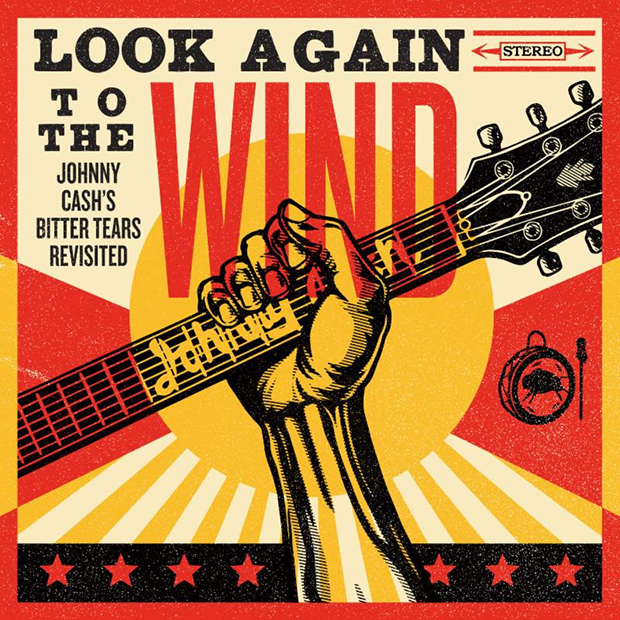Americana Musicians Celebrate 50th Anniversary of Landmark Johnny Cash Album
All the latest guitar news, interviews, lessons, reviews, deals and more, direct to your inbox!
You are now subscribed
Your newsletter sign-up was successful

Of all the dozens of albums released by Johnny Cash during his nearly half-century career, 1964's Bitter Tears: Ballads of the American Indian was among the closest to the artist's heart.
A concept album focusing on the mistreatment and marginalization of the Native American people throughout the history of the United States, its eight songs – among them "The Ballad of Ira Hayes," a #3 hit single for Cash on the Billboard country chart – spoke in frank and poetic language of the hardships and intolerance they endured.
Now, 50 years after it was recorded, a collective of top Americana artists has come together to reimagine and update these songs that meant so much to Cash, who died in 2003.
Look Again To The Wind: Johnny Cash's Bitter Tears Revisited (Sony Music Masterworks, August 19), produced by Joe Henry (Bonnie Raitt, Aaron Neville), features American music giants Kris Kristofferson, Emmylou Harris, Steve Earle, Bill Miller, Gillian Welch and David Rawlings, and Norman and Nancy Blake, as well as up-and-comers the Milk Carton Kids and Rhiannon Giddens, interpreting the music of Bitter Tears for a new generation.
As his project was for Cash, the new collection is a labor of love with a strong sense of purpose fueling its creation.
Watch Cash perform "The Ballad of Ira Hayes" below”
"Prior to Bitter Tears, the conversation about Native American rights had not really been had," says Henry, "and at a very significant moment in his trajectory, Johnny Cash was willing to draw a line and insist that this be considered a human rights issue, alongside the civil rights issue that was coming to fruition in 1964. But he also felt that the record had never been heard, so there's a real sense that we're being asked to carry it forward."
All the latest guitar news, interviews, lessons, reviews, deals and more, direct to your inbox!
Bitter Tears, widely acknowledged for decades as one of Cash's greatest artistic achievements, did not realize its stature as a landmark recording easily and quickly. At the time that Cash proposed the album, he was met with a great deal of resistance from his record label. They felt that a song cycle revolving around the Native American struggle as perpetrated by the white man took him too far afield of the country mainstream and Cash's core audience. Cash still released the album and although it did not perform as well as he had hoped, he remained extremely proud of the album throughout his life.
The album was recorded in three sessions: the first two in Los Angeles and Nashville and, lastly, one at the Cash Cabin, in Cash's hometown of Hendersonville, Tennessee, where Bill Miller cut his contribution. Providing the instrumental backing for most of the album are Greg Leisz (steel guitar, guitars), Keefus Ciancia (keyboards), Patrick Warren (keyboards for the L.A. sessions), Jay Bellerose (drums) and Dave Piltch (bass).
TRACKLIST:
As Long as the Grass Shall Grow - feat. Gillian Welch & David Rawlings
Apache Tears - feat. Emmylou Harris w/The Milk Carton Kids
Custer - feat. Steve Earle w/The Milk Carton Kids
The Talking Leaves - feat. Nancy Blake w/ Emmylou Harris, Gillian Welch & Dave Rawlings
The Ballad of Ira Hayes - feat. Kris Kristofferson w/ Gillian Welch & David Rawlings
Drums - feat. Norman Blake w/ Nancy Blake, Emmylou Harris, Gillian Welch & David
Rawlings
Apache Tears (Reprise) - feat. Gillian Welch & Dave Rawlings
White Girl - feat. The Milk Carton Kids
The Vanishing Race - feat. Rhiannon Giddens
As Long as the Grass Shall Grow (Reprise) - feat. Nancy Blake, Gillian Welch & Dave Rawlings
Look Again to The Wind - feat. Bill Miller
Find out more here.
Acoustic Nation is written by Laura B. Whitmore, a music industry marketing veteran, music journalist and editor, who has contributed to Parade.com, Guitar World, and others. She has interviewed hundreds of musicians and hosts the She Rocks Podcast. As the founder of the Women’s International Music Network, she advocates for women in the music industry and produces the annual She Rocks Awards. She is the Senior Vice President of Marketing for Positive Grid, making the world safe for guitar exploration everywhere! A guitarist and singer/songwriter, Laura is currently co-writing an album of pop songs that empower and energize girls.

